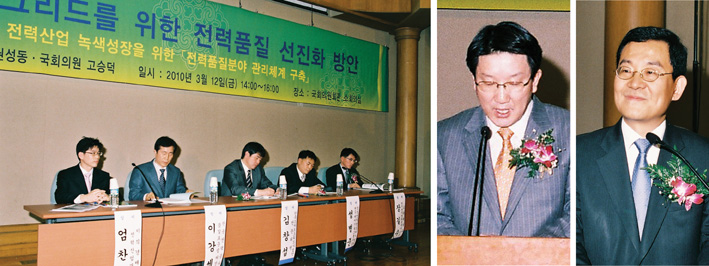Korea Aims to Proliferate Smart Grid by 2030
A symposium proposes the need for upgrading quality evaluation standards for introducing the smart grid

Korea is quickly moving to nurture smart grid technology as a growth engine of the national economy by 2030, as the Korean shipbuilding, semiconductor and automobile industries have been. The nation is one of the trendsetters in the smart grid scheme, as the Jeju Smart Grid Experimentation Complex is in place as a test-bed for most systems related to the operation of smart grids.
Smart grid experts from industry, academia and the government got together for a symposium jointly organized by Rep. Kwon Seong-dong and Rep. Koh Seung-duk, both of the ruling Grand National Party, at the National Assembly Parliamentarians¡¯ Hall on March 12 and discussed ways of advancing the quality of electricity for the development of the smart grid.
While introducing the Jeju Smart Grid Experimentation Complex, Eom Chan-wang, director of the Electric Power Division at the Ministry of Knowledge Economy (MKE), told those in attendance, ¡°The national smart grid roadmap calls for proliferating the smart grid across the nation by 2030.¡±
Eom said the smart grid concept is based on an interactive and open innovation method to expand connectivity and interoperation to new and renewable energies and other sectors on top of the electricity field. He noted that the introduction of the smart grid scheme is designed to control electricity market prices in consideration of economic efficiency under a shift to the low-carbon, green growth paradigm.
Such precision elements as high frequency, momentary voltage sag and flicker should be added to the standards for evaluating the quality of electricity, now focusing on such factors as voltage, frequency and power outage time, in an effort to successfully build infrastructure for the introduction of the smart grid, the symposium has been told.
Prof. Lee Il-moo of Hongik University said, ¡°Such evaluation standards as frequency range rate, voltage range rate and outage frequency are used to evaluate the quality of electricity, but they are less effective in coping with the diversifying of advanced systems and a rise in the use of high-capacity systems.¡±
Prof. Chang Kil-su of Korea University said, ¡°Socio-economic costs related to the quality of electricity are forecast to surge in the future, so the nation will need to build a database for ensuring systematic quality management on top of continuous surveillance.¡± He noted that power companies will have to make efforts to achieve quality standards from the perspective of customers, not suppliers.
In response, Lee Kang-se, chief of the Quality Standardization Team at Korea Electric Power Corp. said his company will strive to revamp electricity quality evaluation standards and build a system to monitor power quality.
About 150 people from industry, academia and political circles attended the symposium, sponsored by the EMC Research Institute and Powernix. Among those present at the session were National Assembly Speaker Kim Hyong-o, GNP Chairman Chung Mong-joon, Lee Kwan-sup, director general for energy policy at the MKE, and KEPCO Vice President Kim Moon-duk. The participating panelists also included Kim Chang-sup, senior staff member of the Korea Smart Grid Institute, and Sung Byung-joon, head of the Samsung Electronics Semiconductor Business Division Electric Control Group.
In his opening speech, Rep. Kwon explained the background of organizing the symposium, expressing his belief that the fundamental thing for building a smart grid is to secure reliability in the quality of electricity by considering such factors as high frequency and flicker, which have been overlooked so far. This will be a boon for completing the smart grid, which will serve as the infrastructure for all industries, including semiconductor and shipbuilding.
A smart grid is a next-generation, intelligent electricity network that connects an energy network and a communications network by grafting it with information technology.
The smart grid market is predicted to see its revenues surging by an estimated $200 billion yearly after 2015.
Smart grids can also help the country nourish the renewable energy sector so that hybrid or plug-in electric cars that require detailed monitoring of power quality can make their debut. nw
Eom Chan-wang, director of the Electric Power Division at the Ministry of Knowledge Economy, speaks at a symposium on advancing the quality of electricity for the development of the smart grid at the National Assembly Parliamentarians¡¯ Hall on March 12. The symposium was jointly organized by Rep. Kwon Seong-dong (second from right) and Rep. Koh Seung-duk (far right).
3Fl, 292-47, Shindang 6-dong, Chung-gu, Seoul, Korea 100-456
Tel : 82-2-2235-6114 / Fax : 82-2-2235-0799